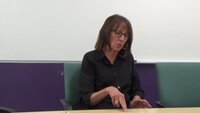| Title |
Zogmaister, Jan OH19_076 |
| Creator |
Weber State University, Stewart Library: Oral History Program. |
| Contributors |
Zogmaister, Jan, Interviewee; Langsdon, Sarah Interviewer; Dove, Alyssa, Video Technician |
| Description |
The Beyond Suffrage Project was initiated to examine the impact women have had on northern Utah. Weber State University explored and documented women past and present who have influenced the history of the community, the development of education, and are bringing the area forward for the next generation. The project looked at how the 19th Amendment gave women a voice and representation, and was the catalyst for the way women became involved in the progress of the local area. The project examines the 50 years (1870-1920) before the amendment, the decades to follow and how women are making history today. |
| Abstract |
The following is an oral history interview with Jan Zogmaister, conducted on August 19, 2019 in the Stewart Library at Weber State University, by Sarah Langsdon. Jan discusses her life and the impact the of the 19th Amendment. Alyssa Dove, the video technician, is also present during this interview.; The following is a video clip of an oral history interview with Jan Zogmaister, conducted on August 19, 2019. In this video clip, Jan discusses her experiences with balancing her work and personal life. |
| Image Captions |
Jan Zogmaister Circa 2019; Jan Zogmaister discussing how she balanced her personal and work life. |
| Subject |
Women's rights; Voting--United States; Women--suffrage |
| Keywords |
19th Amendment; Voting rights; Women in the workforce |
| Digital Publisher |
Stewart Library, Weber State University, Ogden, Utah, United States of America |
| Date |
2019 |
| Date Digital |
2019 |
| Temporal Coverage |
1952; 1953; 1954; 1955; 1956; 1957; 1958; 1959; 1960; 1961; 1962; 1963; 1964; 1965; 1966; 1967; 1968; 1969; 1970; 1971; 1972; 1973; 1974; 1975; 1976; 1977; 1978; 1979; 1980; 1981; 1982; 1983; 1984; 1985; 1986; 1987; 1988; 1989; 1990; 1991; 1992; 1993; 1994; 1995; 1996; 1997; 1998; 1999; 2000; 2001; 2002; 2003; 2004; 2005; 2006; 2007; 2008; 2009; 2010; 2011; 2012; 2013; 2014; 2015; 2016; 2017; 2018; 2019 |
| Medium |
Oral History |
| Spatial Coverage |
Ogden, Weber, Utah, United States, http://sws.geonames.org/5779206, 41.223, -111.97383 |
| Type |
Text; Image/StillImage; Image/MovingImage |
| Access Extent |
33 page PDF; Video clip is an mp4 file, 206 MB |
| Conversion Specifications |
Filmed using a Sony HDR-CX430V digital video camera. Sound was recorded with a Sony ECM-AW3(T) bluetooth microphone. Transcribed using Express Scribe Transcription Software Pro 6.10 Copyright NCH Software. |
| Language |
eng |
| Rights |
Materials may be used for non-profit and educational purposes, please credit University Archives; Weber State University; Music from Uppbeat (free for Creators!): https://uppbeat.io/t/yeti-music/gentle-breeze; License code: IWGKRYG7XHQOMZY0; Music from Uppbeat (free for Creators!): https://uppbeat.io/t/simon-folwar/hope; License code: KYI5VLB63GF1TXND |
| Source |
Zogmaister, Jan OH19_076 Weber State University Archives |
| Format |
application/pdf; video/mp4 |
| ARK |
ark:/87278/s6qk0e01 |
| Setname |
wsu_bs_oh |
| ID |
105482 |
| Reference URL |
https://digital.weber.edu/ark:/87278/s6qk0e01 |
| Title |
Zogmaister, Jan OH19_076 |
| Creator |
Weber State University, Stewart Library: Oral History Program. |
| Contributors |
Zogmaister, Jan, Interviewee; Langsdon, Sarah Interviewer; Dove, Alyssa, Video Technician |
| Description |
The Beyond Suffrage Project was initiated to examine the impact women have had on northern Utah. Weber State University explored and documented women past and present who have influenced the history of the community, the development of education, and are bringing the area forward for the next generation. The project looked at how the 19th Amendment gave women a voice and representation, and was the catalyst for the way women became involved in the progress of the local area. The project examines the 50 years (1870-1920) before the amendment, the decades to follow and how women are making history today. |
| Abstract |
The following is an oral history interview with Jan Zogmaister, conducted on August 19, 2019 in the Stewart Library at Weber State University, by Sarah Langsdon. Jan discusses her life and the impact the of the 19th Amendment. Alyssa Dove, the video technician, is also present during this interview. |
| Image Captions |
Jan Zogmaister Circa 2019 |
| Subject |
Women's Rights; Voting--United States; Women--suffrage |
| Keywords |
19th Amendment; Voting rights; Women in the workforce |
| Digital Publisher |
Stewart Library, Weber State University, Ogden, Utah, United States of America |
| Date Digital |
2019 |
| Temporal Coverage |
1952; 1953; 1954; 1955; 1956; 1957; 1958; 1959; 1960; 1961; 1962; 1963; 1964; 1965; 1966; 1967; 1968; 1969; 1970; 1971; 1972; 1973; 1974; 1975; 1976; 1977; 1978; 1979; 1980; 1981; 1982; 1983; 1984; 1985; 1986; 1987; 1988; 1989; 1990; 1991; 1992; 1993; 1994; 1995; 1996; 1997; 1998; 1999; 2000; 2001; 2002; 2003; 2004; 2005; 2006; 2007; 2008; 2009; 2010; 2011; 2012; 2013; 2014; 2015; 2016; 2017; 2018; 2019 |
| Medium |
Oral History |
| Spatial Coverage |
Ogden, Weber, Utah, United States, http://sws.geonames.org/5779206, 41.223, -111.97383 |
| Type |
Text; Image/StillImage |
| Access Extent |
33 page PDF |
| Language |
eng |
| Rights |
Materials may be used for non-profit and educational purposes, please credit University Archives; Weber State University |
| Source |
Zogmaister, Jan OH19_076 Weber State University Archives |
| Format |
application/pdf |
| Setname |
wsu_bs_oh |
| ID |
105653 |
| Reference URL |
https://digital.weber.edu/ark:/87278/s6qk0e01/105653 |





